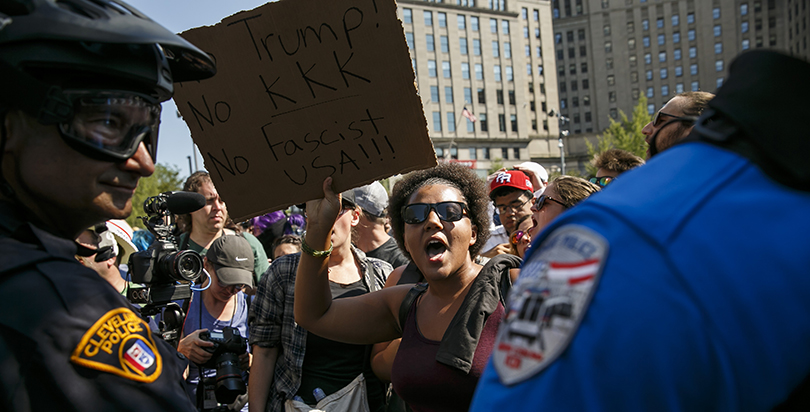Opinion: What Conservative Education Reformers Have in Common with Black Lives Matter

Many conservative education reformers feel trapped between populists on both sides of the aisle who are pushing back on hard-won policies that improve schools (to say nothing of their assault on our broader agenda of economic and political freedom).
Despite the fact that many reform-oriented policies are under attack, white conservatives have failed to build deeper connections to close allies in the movement to reform schools who share our opposition to this populist turn: African-Americans and anti-racism activists. If we made changes to our agenda that reflect their needs, we would strengthen not just education reform, but the American center-right generally.
On the surface, the two groups seem clearly at odds. Many conservatives are uncomfortable with the tactics of sit-ins and highway shutdowns used by Black Lives Matter. Many of us reflexively draw connections to Occupy Wall Street and 1970s anti-military protests based purely on images of protesters swarming the streets with placards and bullhorns.
Our preferred tactics — elite negotiation, state-level policy change, and shaping public opinion through mainstream institutions like old-school media and think tanks — reflect our fundamental trust in the forces of the status quo. We struggle to understand those who take to the streets.
Our disconnect on tactics distracts us from the reality that we share deeply held goals in common. People of color value institutions and want to improve them, just as conservatives do. Police-reform protestors do not want to destroy police departments; they want to be protected by law enforcement officers who use force in a race-neutral manner, when appropriate. The agendas of many racial justice organizations take as a given that existing institutions are valuable and merely seek to rid them of racism.
Yale professor James Forman, Jr. has noted the complexity of African-Americans’ attitudes about “tough on crime” policies as well; Black Lives Matter’s critique of American policing comes from a community with more nuanced views on law enforcement than many conservatives realize.
White education reformers do not have to go far to see this attitude in action. Our colleagues of color in education reform typically value markets and share our vision for upward mobility through better schools and a focus on civic education and empowerment. We should not let a divergence on tactics distract us from the fact that we share many goals with anti-racism protesters.
This institutionalist, even conservative outlook among people of color is not new, either. The African-American community has focused on the power of institutions for self-improvement over the entire course of its fight for equality. James D. Anderson’s seminal The Education of Blacks in the South, 1860-1935 tells the story of a race that yearned to build schools even before it escaped the bonds of slavery.
W. E. B. Du Bois contended that “public education for all at public expense was, in the South, a Negro idea.” In The Souls of Black Folks, Du Bois also points out that black churches existed as institutions even before black homes in the South. He describes black religious institutions as “peculiarly the expression of the inner ethical life of a people in a sense seldom true elsewhere.” This belief in the potential of civic and community bodies holds true for many in Latino and Asian-American communities as well. These are our people, in a way that we have failed to recognize repeatedly, over generations.
In an environment where sitting governors are calling for the criminalization of political disagreement and a huge swath of the American right has become fundamentally anti-establishment and radical, the belief of people of color in the power of civic institutions to promote human freedom is a rare and valuable asset. Conservative nostalgia for the days when race was a less explosive issue (for white people) and our distaste for the tactics of protest threaten to cut us off from the powerful work being done by movements against racism to redeem American institutions.
We cannot let them do so.
This opportunity involves more than just a shared agenda to reform the public sector. As the American electorate becomes more racially diverse, the right has increasingly turned to white identity politics in order to win elections. This presidential cycle suggests that the cost may be the loss of our conservative values as free trade, small government, and sensible taxation have all been deemed disposable on the road to November.
Conservatives can continue to tilt in the direction of white voters in the hopes of eking out electoral wins, no matter what those voters ultimately demand. Or we can see an opportunity in the fact that, although people of color tend to vote for liberal politicians, they are ideologically diverse, and there is a huge and growing gap between their beliefs and their voting patterns.
African-Americans are the most Democratic-leaning racial bloc in the United States, and yet only 50 percent actually hold economically liberal views. Several education reformers of color noted over the past several months that they do not identify as liberal on all issues and are confused when they are pigeonholed as “leftists” due to their views on race. Furthermore, concern with abuses committed by public servants in uniform, protected from accountability by their unions, fits with conservatives’ decades-long criticism of teacher unions that put their own interests before those of students. We should not leave it to liberals alone to criticize the racist abuse of power by public servants.
The Movement for Black Lives platform released this week is worth noting in this context. In the absence of a robust discussion of the needs of black Americans across the political spectrum, the anti-racist voices that speak loudest are liberal ones. The M4BL platform calls for reparations, yet 35% of African-Americans oppose the idea. Its opposition to free trade and fossil fuels is only tenuously connected to the message that black lives matter and does not represent the central priorities of African-Americans broadly.
The platform calls for a moratorium on charter schools — and the NAACP may soon take a similar position — when African-American parents overwhelmingly support them. Far from representing proof that conservatism can never appeal to people of color, this demonstrates that neglecting a racial group’s basic struggle for rights and political power has left conservatives with no voice among non-whites in America.
What, then, will conservative education reformers do? So far, our collective response to the growing voice of people of color in the movement has been to mislabel their ideas and fight to constrain them to issues with which we are already comfortable and conversant. We should instead listen intently to Black Lives Matter and other anti-racism activists when they connect the dots between school reform and the work of ridding other social institutions of racism.
We should take seriously the fact that many of them are putting their physical safety at risk in order to raise these issues. Serious engagement with anti-racist ideas will enlarge the conservative agenda and strengthen our ability to preserve and expand freedom.
The emergence of Black Lives Matter presents an enormous opportunity to right-leaning education reformers who want to improve public sector accountability, trust in institutions, and racial equity to change America for the better. These key features of the anti-racism agenda fit comfortably with conservative ideology. If we give the anti-racism agenda of Black Lives Matter the attention it deserves, we can emerge with a more robust version of conservatism that appeals to Americans of all races.
Get stories like these delivered straight to your inbox. Sign up for The 74 Newsletter

;)
